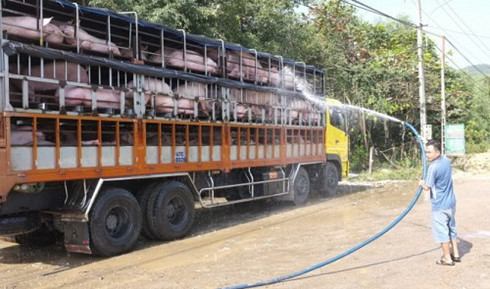
Live pig prices in Vietnam have dropped significantly following a sudden buying halt from Chinese traders, who were willing to import the animals at any quality at high prices.
 |
Live pig prices in Vietnam have dropped significantly following a sudden buying halt from Chinese traders, who were willing to import the animals at any quality at high prices.
In northern regions, pig prices has decreased to VND51,000-52,000 (US$2.28-2.32) per kg, which is VND6,000-7,000 (US$0.26-US$0.3) lower than the beginning of this month.
“Prices began dropping this week and losses are guaranteed for farmers as Chinese traders stopped buying,” Tran Van Chuong, a farmer raising a herd of 700 pigs in Binh Luc District of Ha Nam Province, said.
Pham Thi Hue, another Binh Luc trader who sold live pigs to China, said that she had lost VND270 million (US$12,077) as the Chinese stopped purchase.
Farmers in Dong Nai Province, a pig farm powerhouse in southern Vietnam, shared the fate as the prices plummeted rapidly to VND50,000 (US$2.236) a kg.
Dong Nai accounted for more than 50% of the total number of pig exports to China, said Nguyen Kim Doan, deputy chairman of the province’s animal husbandry association.
“If Chinese traders stop sourcing Vietnamese-raised pigs abruptly, it is surely a great threat to local raisers,” Doan added.
Nguyen Van Trong, deputy head of animal husbandry department under the Ministry of Agriculture and Rural Development, confirmed that China had stopped buying pigs at the Chinese border gate in the northern province of Lang Son, resulting in the rapid fall of pig prices in recent times.
Vietnamese pig farmers could in fact have avoided such hardship, as it is not uncommon for Chinese traders to source Vietnamese products, from rice, fruit and seafood, in large quantities before stopping trade abruptly.
The decision to halt purchase is usually made when trucks carrying the produce are already waiting at the gates to enter China. The products eventually must be destroyed, with farmers were left in debt.
Warnings have been issued when local farmers rushed to expand their herds to meet Chinese demand last month, but were ignored as farmers could not resist the attractive prices offered by traders in China.
(Source: TTNews)




